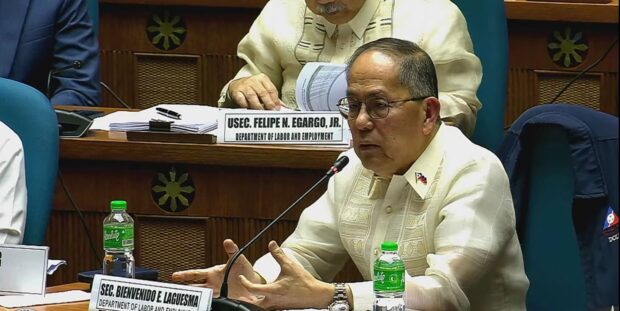
Labor Secretary Bienvenido Laguesma explains to lawmakers during the discussions on DOLE’s proposed 2024 national budget that emergency employment projects get a high allocation due to the high number of calamities affecting the country annually. (Screenshot from the House of Representatives’ livestream)
MANILA, Philippines — The high number of natural disasters in the country is a major reason why a huge chunk of the Department of Labor and Employment (DOLE) proposed budget for 2024 is allocated to emergency employment, Secretary Bienvenido Laguesma said on Thursday.
Laguesma during the hearing of the House Committee on appropriations was asked by OFW party-list Rep. Marissa Magsino as to why a P23 billion of the P23.426 allocated to workers’ protection and welfare program — or a staggering 98.2 percent — will be for emergency employment programs.
In particular, Magsino claimed that P20.13 billion will go to the Tulong Panghanapbuhay sa Ating Disadvantaged/Displaced Workers (TUPAD) — which is emergency employment for people in areas hit by calamities.
“Why do we have a huge discrepancy of allocation between the livelihood and emergency program and our welfare services program. It appears that the TUPAD is the single most important program of DOLE in terms of social protection for our vulnerable workers, why is this the case?” Magsino asked in Filipino.
Laguesma said that while the direction of the government is to eventually minimize emergency assistance by equipping workers in communities with the skill and materials needed for a sustainable livelihood, DOLE cannot just turn a blind eye to calamity victims.
“Although that is what the data would show, as you have mentioned, we are slowly transitioning towards a situation where we would give more funding to projects with a long-term intervention, and those with a sustainable livelihood program,” Laguesma said.
“But we cannot just do this abruptly because I know you understand that the country, unfortunately, is calamity prone,” he added.
Laguesma highlighted several instances where emergency employment was needed — after the onslaught of Typhoon Egay and the southwest monsoon-induced rains that devastated Northern Luzon and Central Luzon, and the Mayon Volcano unrest which threatened parts of Bicol Region.
“As we speak there are a number of things happening, even though we have a specific amount allocated, there comes a point where these unfortunate incidents happen successively or simultaneously,” he said.
“For this year, our Region 1, CAR (Cordillera Administrative Region), Region 2, were hit by a strong typhoon, including Region 3. And as we speak, Region 5, our Bicol Region, Mayon Volcano, we continue to give out emergency employment as a guide because we do not want them to sustain further damage,” he added.
READ: MMDA, DOLE ink agreement on temporary workers for public schools’ upkeep
READ: P33M aid allocated to 3 Albay districts amid Mayon Volcano’s activities — Romualdez
Laguesma also told Magsino that some of the allocations were meant to assist people whose industries were hit by the COVID-19 pandemic.
“Some of the amounts you mentioned actually, these were brought about by the pandemic, it is still there because of the lingering effects of the pandemic eh, so right now the directive of the President is for us to slowly move — we cannot completely disregard those who need assistance from temporary employment,” Laguesma said.
“But our direction now is to look beyond the temporary provision of social aid, as maybe, before we leave them, they can already stand on their own,” he added.
Living wage
Aside from the TUPAD issue, Laguesma was also called out for the low minimum wages of workers across the country — including the paltry P40 increase in the daily salaries of minimum earners in the National Capital Region.
Gabriela party-list Rep. Arlene Brosas questioned Laguesma several times as to whether the wages set by the National Wages and Productivity Commission (NWPC) is in accordance with constitutional provisions of a livable wage.
“Mr. Chair, it is stated in Section 3 Article 8 of the 1987 Constitution that workers have a right to a livable wage and it should be ensured by DOLE, right? So how does DOLE define the concept of a living wage because the wage increase was only at P40, and it was only for the National Capital Region — not nationwide,” Brosas said.
“[DOLE] and [NWPC] understands the direction set by our Constitution, and the NWPC follows a roadmap to respond to that. But we cannot do it in a rush because we have factors to consider and I know that lawmakers know, the members of the committee know, that there are guidelines as to the resolution of minimum wages — R.A. No 6727 is there,” Laguesma replied.
NWPC approved the P40 minimum daily wage hike for private sector workers last June 27. However, people from all walks of life — labor unions, opposition lawmakers, and pro-administration senators have questioned whether such an increase is sufficient.
READ: P40 hike in Metro Manila minimum wage still not enough — senators
READ: P40 minimum wage hike in Metro Manila too little, too late — TUCP
Laguesma said that while the P40 increase may be small, it also takes into consideration micro, small, and medium companies who may be financially affected if wage increases go beyond what was prescribed.
“It’s not easy to balance or weigh the state and needs of our workers. Similarly, it is hard to analyze the capacity of those who invest, and part of these considerations is the possible implication to the level of employment. But in the direction we are heading, we want to focus — maybe the P40 increase is lacking for others, but the Regional Tripartite and Productivity Boards also check if movements would help small companies,” he said.
“So we do not forget the direction we are heading to and the promise that there will be a time where our desired living wage is possible. We are following a roadmap towards that goal,” he added.